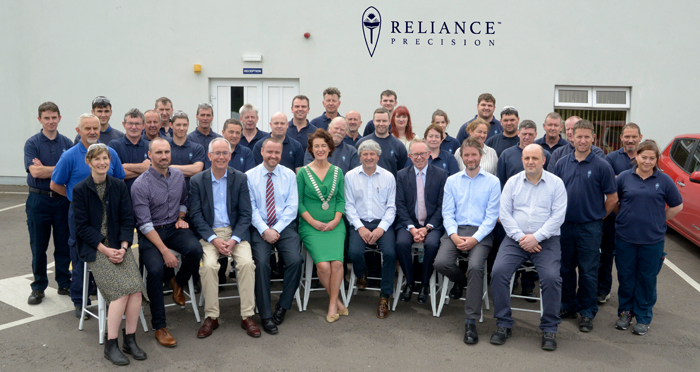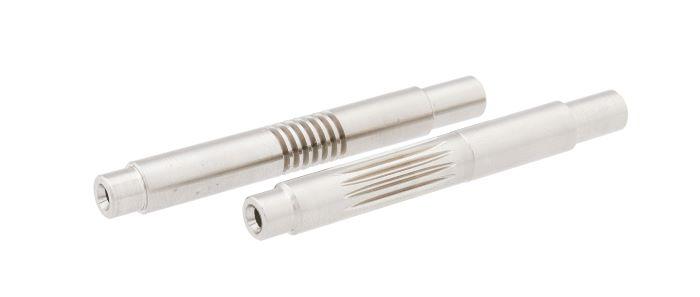The achievement is a result of a joint collaboration between the European Space Agency (ESA), University College Dublin (UCD) and RPMI. In 2019 the ESA announced funding was being made available for R&D projects on the use of Bulk Material Glasses (BMGs) for applications in space.
BMGs are a special family of metal alloys with unique properties. They are characterised by their amorphous structure, resulting in a material with extremely high strength, corrosion resistance, high hardness and high elastic limit. This, coupled with the added benefit of not requiring lubrication, makes it an ideal material for use in space.
UCD formed the alliance with RPMI to make a joint bid for the project. UCD has expertise in metallurgy and in particular, a track record of research on BMGs. Reliance has a strong presence in the precision engineering sector, having already designed and manufactured components, such as gear mechanisms, for deployment in space.
With a successful bid for the funding achieved, the project began in the Summer of 2019 with RPMI advising UCD of the type of space-related products that should be the target of the work. UCD then began a two-year investigation in their Belfield labs to come up with the BMG alloys most suited to Reliance’s gear products. An alloy comprising a special recipe of the metals zirconium, copper, aluminium, titanium and yttrium was deemed the best fit.
Cylindrical BMG rod specimens were made at UCD and sent to RPMI in Bandon for machining trials. The manufacturing team at Bandon then had to determine how best to machine the BMG rods into various shapes of precision gears. What the RPMI team quickly realised was that whilst their standard state-of-the-art manufacturing equipment and cutting tools could be used, they needed to develop the cutting process suitable for the BMG. RPMI then began their own R&D project to develop the method, which resulted in a change to the cutting parameters, as well as significant alterations to the amount of material that could be removed at any one time. The trials were completed in December 2021, with the successful manufacture of a range of precision gears at just 6 mm (1/4 inch) in diameter to high accuracy.
To mark the success of the project, and its subsequent endorsement by the ESA, RPMI hosted an event last week at their Bandon site for the project team to come together to celebrate and discuss next steps for their collaboration. Attending from UCD were Professor David Browne; Dr Andrew Murphy, Postdoctoral Researcher; and Philip Meagher, PhD student. From RPMI and Reliance were James McGettrick, Engineering Manager; Graham Beamish, Engineer; Brendan Hurley, Production Operator; Tom Worsley, Technical Director; Zahari Zlatev, Manufacturing Engineer; Charlotte Brandes, Director RPMI; and Tadg Collins, Director and General Manager RPMI. Also invited to the event was local County Mayor, Gillian Coughlan. With two family members amongst the first employees at RPMI in 1970, Mayor Coughlan was keen to tour the facility and see first-hand the intricate nature of the machining achieved by RPMI.

Professor David Browne, who leads the UCD team comments: “We really enjoyed working on this project with Reliance. They have always been a pleasure to work with and we have achieved a lot more together than we could ever have accomplished working alone. I am looking forward to taking this work even further with our Reliance partners in Bandon and Huddersfield”. He continues “We are planning to propose a follow-on project to the ESA which will involve testing the new gears in a small transmission device, and also experiments to test in conditions which simulate the space environment such as high vacuum and varying temperatures, from very cold to very hot. Applications beyond the Space sector are also foreseen.”
Reflecting on the day and the continuation of the project, Tom Worsley, Reliance’s Technical Director, concludes “The combination of Reliance Precision’s unique process capabilities, and UCD’s world-class materials research, puts advanced manufacturing in Ireland on to the world stage. Together we are pushing the boundaries of what is possible for high precision gear mechanisms in challenging environments such as space, and we look forward to the opportunity to continue this R&D collaboration into the next phase of the BMG project.”



